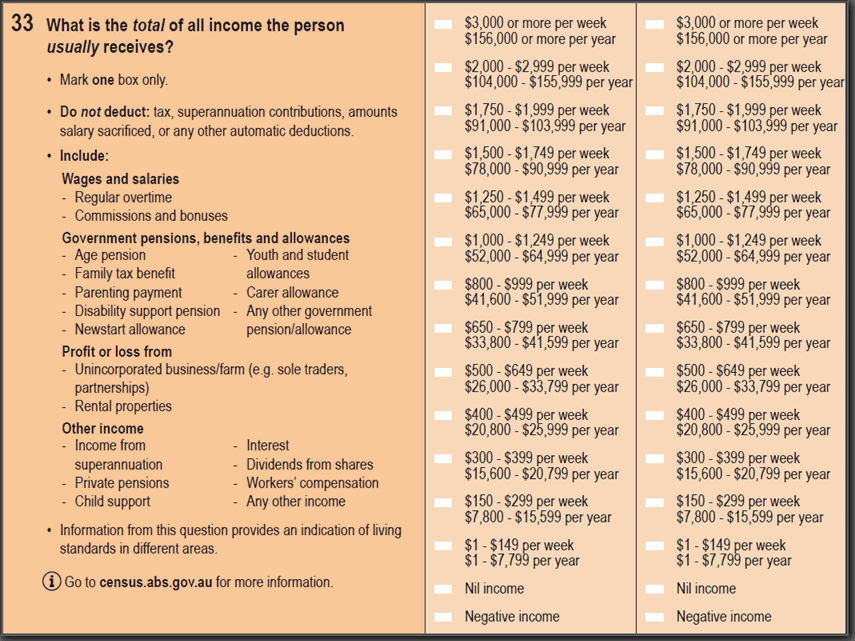Total Family Income as Stated (weekly) (FINASF)
This variable records the sum of the Total Personal Income (weekly) of each family member aged 15 years and over present in the household on Census night who stated their income. Total Family Income as Stated (weekly) is applicable to all families where one or more members is aged 15 and over.
How this variable is created
Data for this variable is derived from the Relationship in Household, Income and Persons Temporarily Absent questions on the Census Household Form. Images of these questions are provided below.
Total Family Income as Stated (weekly) is calculated by summing the personal incomes reported by all family members aged 15 years and over. The Census collects personal income in ranges, so before these can be summed a specific dollar amount needs to be allocated to each person. Median incomes for each range, derived using data from the Survey of Income and Housing are used for this purpose.
The income ranges for Total Family Income as Stated (weekly) include families where one or more family members aged 15 years and over did not state their income, or were temporarily absent. For the Total Family Income (weekly) variable these families would be excluded from the family income calculation. They would be coded to the Total Family Income (weekly) category 'Partial income stated'.
Variable history
This variable was first introduced in 2006. For the 2016 Census, categories for family income in dollar ranges have been revised.
Non-response rate
Item non-response rates are a measure of how many people did not respond to a particular question as a proportion of the total number of people the question was applicable to. In this instance the response is left as not stated.
The majority of item non-response is attributable to the people who did not respond to the Census at all. The second and smaller contributor to item non-response is when people return a Census form but may not answer a particular question(s). For more information, refer to Understanding Census data quality
The non-response rate for this variable where all persons in the family did not state an income was 1.5% (2.0% in 2011).
Data usage notes
People may be missed from the persons temporarily absent section of the form as they are not present in the household when the form is being filled out. This can occur in both family and group households. Additionally, due to form limitations a maximum of three people can be reported and coded as temporarily absent from the dwelling. If more than three people are absent from the household the additional persons are unable to be included on the form.
Total Family Income as Stated (weekly) can be used in conjunction with Total Personal Income (weekly) to create a new family income variable. Total Family Income as Stated (weekly) should be used with caution when comparing to other family data from within the ABS and for external organisations or agencies. The definition of a family can differ between different statistical collections and may not match Census definitions.
Further information
A definition for Total Family Income as Stated (weekly) is available in the 2016 Census Dictionary.
For information on the Relationship in Household question and data item, see the data quality statement for Relationship in Household.
For information on family type and family composition, see the data quality statement for Family Composition.
Household form question image
Questions 5, 33 and 53 as they appear on the 2016 Census Household Paper Form:



A text only version of the online Census Household form is available from the Downloads tab.
 Print Page
Print Page
 Print All
Print All